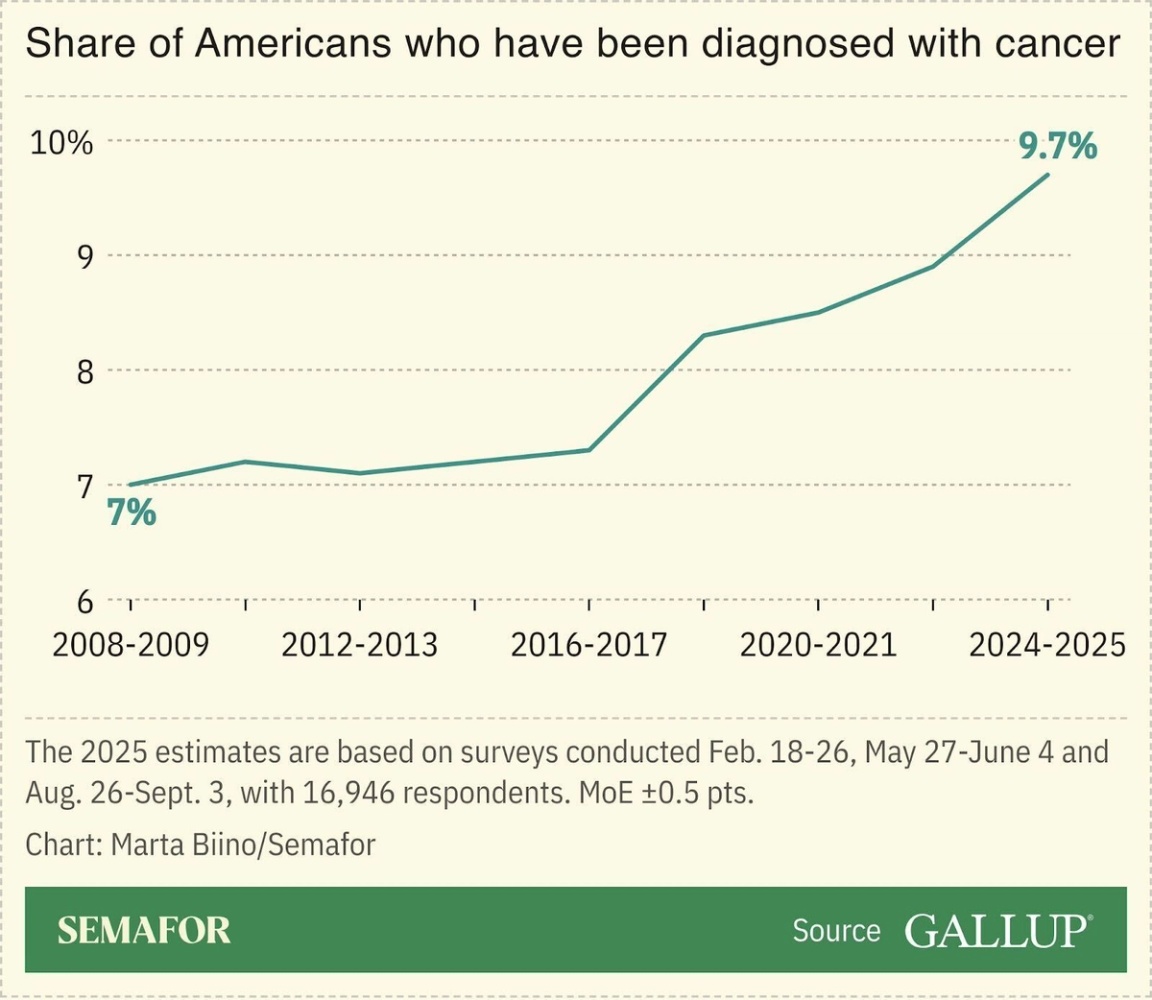| | In a special edition of Semafor Washington, DC, we explore the state of health care policy in the US͏ ͏ ͏ ͏ ͏ ͏ |
| |  | | | Health Forum Edition |
| |
|
 - Senate’s appetite for subsidies deal
- House’s ACA hurdles
- Trump’s drug price progress
- MAHA’s next challenges
- Cancer prevalence
|
|
The challenges of a health insurance subsidies deal |
 Tom Brenner/Reuters Tom Brenner/ReutersThe Senate can do big things when it wants to, but these are challenging conditions for extending the expiring enhanced Affordable Care Act premium tax credits — even as President Donald Trump prepares to wade into the issue. Senators will return to Washington on Dec. 1 and will have approximately 10 days before the vote on extending the credits that Majority Leader John Thune promised Democrats. That’s not a lot of time for senators working on their own deal, and Democrats aren’t even sure whether a bipartisan agreement would get support from Trump or House Speaker Mike Johnson. Sen. Tammy Baldwin, D-Wis., said thus far Democrats are “very troubled” by the White House’s position; the president could release his own plan this week, but timing remains in limbo. If the Senate falls short, in two weeks, that could be curtains for the credits. “If it doesn’t come together by the end of the year, I doubt it will come together,” said Sen. Thom Tillis, R-N.C. — Burgess Everett |
|
White House throws House a curveball |
 Kevin Lamarque/Reuters Kevin Lamarque/ReutersThe White House’s proposal poses a particular curveball for the House, where it had been looking increasingly unlikely that the GOP would OK any health care deal that extends enhanced Affordable Care Act subsidies. Blue-state and moderate Republicans desperate to keep their constituents’ premiums from rising are still “working through it,” Rep. Mike Lawler, R-N.Y., who huddled with a bipartisan group last week, told Semafor. But their conference’s leaders had become yet more open about lawmakers’ desire to negotiate unrelated reforms — a more time-intensive and partisan exercise — instead. “Our people are much more motivated to [pursue] things like health care savings accounts and market forces,” House Appropriations Chair Tom Cole, R-Okla., said. “I don’t think whatever happens is likely to look like the status quo perpetuated by extending subsidies; I just don’t think that’s going to fly.” For now, leaders are still “listening to the conference,” House Energy and Commerce Chair Brett Guthrie, R-Ky., said. — Eleanor Mueller |
|
Trump leans on dealmaking to lower drug prices |
 Jonathan Ernst/Reuters Jonathan Ernst/ReutersBeyond the ACA subsidies debate, Trump has spent much of the year rolling out proposals to lower drug prices: He announced an agreement with AstraZeneca recently to cut its prices for Medicaid patients down to “most-favored-nation” levels, with an added partnership on a new “TrumpRx” website that’s aimed at directing consumers to lower-cost drug prices. Soon afterward, Trump touted a deal with EMD Serono aimed at lowering the cost of certain fertility medications — not fulfilling his campaign promise to have the government pay for fertility services, but still making the expensive process more accessible for women around the country. And he’s also inked a deal with two companies to lower the cost of popular weight loss medications. Trump’s push for making deals with drug companies has become a staple of his second term. — Shelby Talcott |
|
Kennedy’s power remains strong at HHS — for now |
 Nathan Howard/Reuters Nathan Howard/ReutersHealth and Human Services Secretary Robert F. Kennedy Jr. continues to enjoy unfettered power to make decisions that range from the popular (action against synthetic food dyes) to the politically polarizing, such as his recent removal of language to the US Centers for Disease Control website that states there is no link between vaccines and autism. But his standing within the Trump administration isn’t guaranteed to stay solid — Kennedy’s supporters in the online “Make America Healthy Again” movement continue to raise questions about whether the influence of MAGA has tempered some of his goals. One flashpoint to watch: who, if anyone, will get Trump’s nod to replace ousted CDC chief Susan Monarez. The disease control center is currently led by an acting chief, Jim O’Neil, who is a longtime ally of billionaire venture capitalist Peter Thiel. |
|
More Americans report having cancer |
 The percentage of Americans who say they’ve been diagnosed with cancer at some point in their lives is rising — but it’s not necessarily bad news. That’s because one reason the number is higher is that people are living longer after they are diagnosed. According to new Gallup polling, nearly 10% of US adults say they’ve been diagnosed with cancer at some point, a number that has steadily increased since the 2000s. The percentage of older Americans who report having been diagnosed with cancer in their lives is 21.5%, an increase of more than 3 percentage points since 2008-2009. At the same time, however, research shows that cancer death rates are on the decline. Still, this trend represents significant pressure on the US health system, as more people require treatment. |
|
 White House- The legislative proposal that President Trump plans to pitch would include a two-year extension of the enhanced Affordable Care Act subsidies as well as an income cap and minimum payment requirement for beneficiaries. — Politico
- Trump and Wall Street are at odds over how they view Affordable Care Act insurers. — WSJ
Congress- Rep. Marjorie Taylor Greene’s, R-Ga., decision to resign from the House this past weekend stemmed from her frustration with Republican leaders and their handling of expiring health care subsidies and the government shutdown.
Administration- Health and Human Services Secretary Robert F. Kennedy Jr. acknowledged personally instructing the CDC to back away from longstanding language on its website stating that vaccines don’t cause autism — “a move that underscores his determination to challenge scientific consensus and bend the health department to his will.” — NYT
Foreign Policy- The impact of a potential military conflict with China over Taiwan could leave more Americans dying of disease than soldiers on the battlefield, President Joe Biden’s former drug czar told Semafor.
CourtsImmigrationPublic HealthSemafor DC TeamEdited by Morgan Chalfant, deputy Washington editor With help from Elana Schor, senior Washington editor Emily Ford, editor Graph Massara and Marta Biino, copy editors Contact our reporters: Burgess Everett, Eleanor Mueller, Shelby Talcott, David Weigel |
|
| |